Shannon Airport, Online Radicalisation and Why ISIS place Ireland in the Coalition of Devils
In November, the Irish State ordered for the deportation of a man in his fifties, born in a Middle Eastern country, who has resided in Ireland for fifteen years. Described by the Irish Times as “the foremost member of the Islamic State in the jurisdiction”, the man is alleged to have acted as a recruiter for the group, assisting radicalised persons in fulfilling their intentions to travel and fight in Iraq, Syria, Afghanistan, or similar zones of conflict.
If these allegations, based on state gathered intelligence, though denied by the accused, are proven true, then his work as the “main recruiter” in Irish jurisdiction would mean he has likely had influence in aiding at least a fraction of the estimated 30 Irish citizens currently fighting in the Middle East today. This role as a recruiter is indeed a threat to national security, as it enables a person with radical leanings to access militant training. Yet, the level is debatable, since it depends on whether said militarised person decides, or is capable of returning to Irish shores.
Contrary to the glut of right-wing/conservative political statements, and partisan reports, which have a proclivity to point the narrative towards refugees as the ISIL Trojan horse, the fact is the main assailants in both the November 13th and Charlie Hebdo massacres in Paris, were French residents, militarised in extremist training camps, who succeeded in returning to their home country. Bearing this in mind, while also taking into account the fact that, when ISIL’s Al-Hayal Media Centre issued their recent propaganda video, labelling Ireland in the Coalition of Devils, the questions that one may want to ask are why we are classed as a member of this coalition, and to what extent are we vulnerable?[pullquote]Why are we classed as a member of this Coalition of Devils, and to what extent are we vulnerable?[/pullquote]
Regarding the former, and since the early days of both the wars in Afghanistan and Iraq, the answer many political commentators and activists state has been Shannon Airport. Independent TD Mick Wallace, whose recent legal disputes were centred on his and Socialist TD Clare Daly’s protesting the refuelling of US military aircrafts in the airport, has stated Ireland to have “direct culpability” in contributing to the breakdown of the Middle East, because of this assistance. Emphasising that the Irish government granting US military aircrafts an opportunity to stop in Shannon is contrary to our neutrality, this concern, it is argued gives extremist cells reason to label us an enemy.
In terms of Shannon’s usage, the latest statistics available come from 2014, and one can see a decrease in numbers from previous years. For example, troops that passed through the airport, Shannon Watch reported as being a total of 55,405, down from 69,840 in 2013, 101,108 in ’12, and 250,000 in ‘11. Furthermore, the number of “civilian” aircrafts carrying troops and cargo was 506 (509 in ’13, 991 in ’12, and 2,651 in ‘11). Permits granted for the landing of military aircrafts were 741 (90% being US military), which is a rise from 366 in ’13 (up to September 30th) and 666 in ’12. Permits issued for the transport of war munitions through Irish airspace was 584 out of 606 applications made (93% being US), a further decrease from previous years once again (’13: 693/714, ’12: 807/812, ’11: 1382/1393).

Both Wallace’s and Daly’s condemnations have earned them criticism from Minister Joan Burton, who warned that advertising such facts could serve only as a detriment to Irish security. However, and as has been mentioned by people of varied backgrounds, such as Irish Times security analyst Dr. Tom Clonan, human rights lawyer Curtis Dobbler, pro-Sharia law activist Anjem Choudray and Labour leader Jeremy Corbyn, since as early as the Iraq War, the US military presence at Shannon has been common knowledge in the Arabic world.
Hence, in early December, I contacted John Lannon of ShannonWatch, to gain a clear picture of Shannon as a military stopover in 2015. Since the summer, the anti-war group has gained a larger amount of media attention than in previous years, with this growing furthermore during the month of October when a US AC 130 W aircraft destroyed a hospital in Kunduz, Afghanistan, being used by Doctors without Borders.[pullquote]Since as early as the Iraq War, the US military presence at Shannon has been common knowledge in the Arabic world.[/pullquote]
The strike, lasting a total of 30 minutes, resulted in forty-two deaths, and a further thirty injuries. It was, according to the group, a stark reminder of Ireland’s potential guilt in American war crimes, since an AC 130 W had refueled in the airport on September 5th, 2013.
In Mr. Lannon’s view, Shannon airport was the exact “environment that breeds reactionary responses from radical groups.”
It was designed as a civilian, not military airport. There are no bulwarks against explosions, accidental, or otherwise. It is not secure to the level it would need to be to respond to an attack, or accident. People can wander into it at any time. Margaretta D’Arcy, a 75 year old protestor made her way out onto the middle of the runway before being apprehended for her peaceful action over a year ago. There was very little security and I have not seen many changes since then.
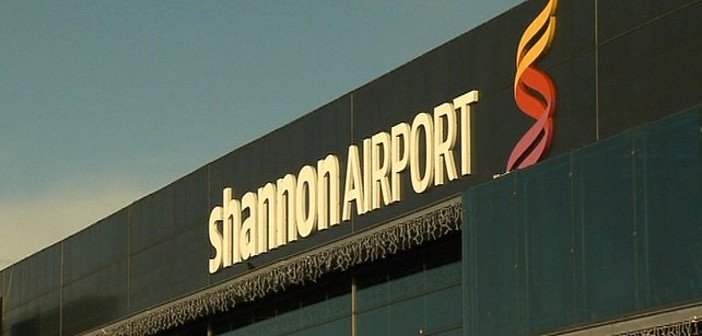
On the matter of its usage as a stop for US “civilian” and military aircrafts this year, he said, “As far as I know, the number of armed troops that came through this year is in the order of 40 to 50,000. They would be going to US bases, where they will be deployed into theatres of war, such as Afghanistan. We are told by our government that these are not involved in military operations, but frankly that is very difficult to believe.”
Their air force and navy perform military operations and exercises. It’s their raison d’etre. These planes come through all the time, but we’re not told what they are doing. If they are involved in humanitarian operations, our government should provide clarity about that, but as it stands, there is just absolute secrecy. This means it is covert.
We have known all along that there are munitions being carried on so-called civilian planes. The Omni Air International troop carriers have the personal weapons of every single troop going through. Atlas Air and other such civilian airlines take weapons across Irish airspace either with troops, cargo loads of munitions or munitions parts. That is known and admitted by the Department of Transport who are responsible for them, and then, by the Department of Foreign Affairs who, it is claimed, gives clearance for that to happen.
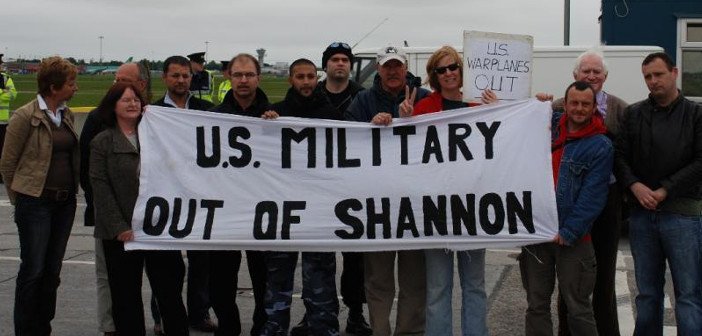
Continuing, with regards actual military aircrafts, Lannon labelled the denial of their partaking in operations, and the transport of munitions as being “farcical.” “Minister Charlie Flannagan recently admitted that there are certain military and state planes coming through with what he calls armed security personnel onboard. This means there are weapons, despite what he has said in response to other claims when he said there were not weapons onboard.”[pullquote]”When (the planes) land and are brought to the attention of the Minister, they’re dismissed as administrative errors. Now, how many of these errors can there be covering armed planes landing in Shannon?”[/pullquote]
At this point, he referenced the Hercules AC 130 W, which landed on September 5th, 2013, and was visibly carrying a 30mm modified MK-44 canon. The response given by then Minister of Foreign Affairs and Trade, Eamon Gilmore was that this was an “administrative error.” However, Lannon told me such explanations were unsatisfactory.
“When they land and are brought to the attention of the Minister, they’re dismissed as administrative errors. Now how many of these errors can there be covering armed planes landing in Shannon? Either there is policy of oversight to insure that they are not involved in military operations carrying weapons, or there is a complete failure at attempting to implement that type of policy.”
Ireland claims to be neutral, but there are belligerent forces here. The government must insist that these forces stop using Shannon. In 2008, RTE reported that the US said they would leave Shannon if requested, but our government maintained that they could go on using it. I don’t believe it would be such a significant move for the US forces to stop.
There are other airports, Germany in particular. From an operational point of view in terms of what is happening in the Middle East and US Foreign Policy, this would not make a huge difference. If Ireland were to make a point of remaining neutral, refusing to support wars of aggression, or occupations by the US, then that would be a strong message to the international community, to NATO and to other such forces continuing the cycle of violence in the Middle East.
Our conversation ended soon thereafter, and two weeks later, I arranged to meet up with Shaykh Dr. Umar al-Qadri, a Sunni theologian, who chairs the Irish Muslim Peace and Integration Council. An outspoken leader within Ireland’s Muslim community, he gained a strong public profile over the past year for his firm position against radical Islam.
Meeting at his main offices, tucked away on the outskirts of Blanchardstown, the first sight to greet me was a sign, which denounced ISIS for its claim to speak on behalf of Muslims. Inside, the office is less a construct of brick, than books. By his desk were some recent newspapers, the front pages brandishing headlines about the November 13th Paris atrocities, and in the corner, Dr. Al-Qadri sits at his laptop, behind a pair of dark glasses.
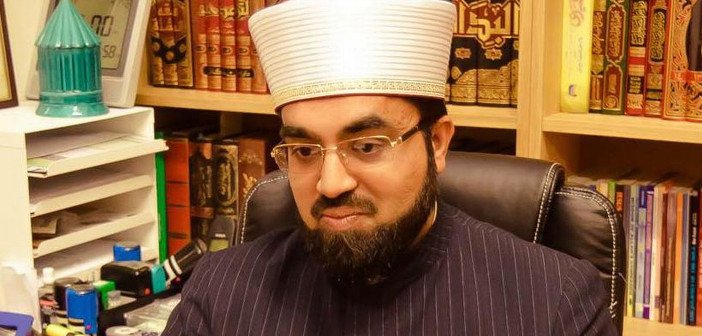
Starting by noting that I had spoken to Mr. Lannon on security matters relating to Shannon, my interest here was to get a social and theological scope on Islam in Ireland and internationally today. With this, he began calmly with a brief statement: for the duration of our hour long conversation, he would refer to the caliphate as Daesh, and urged me to undermine its existence by doing the same.[pullquote]To Daesh, everyone who does not agree is an enemy and anyone supporting their enemy is also their enemy.[/pullquote]
After this, he followed himself up, saying, “The phenomenon of Daesh is in the unexpected. They can hit anywhere. Shannon’s usage would mean Ireland is a target, but they have also recently talked about hitting the Twitter headquarters in Dublin. To them, everyone who does not agree is an enemy and anyone supporting their enemy is also their enemy.”
In saying that, so far, the vast majority of its victims are Muslims, in Muslim majority countries. But, with the lone wolf attacks in Paris and the US, we can see this could happen anywhere today. That is something we must be prepared for, but we should do this by uniting. If we are to tar all Muslims with the same brush, then that furthers the cause of ISIS, because it pushes more Muslims towards radicalisation.
It is important that we have preventative measures put in place. I do think that the government are doing this. Shannon after all was used during the Iraq War, and we didn’t see any attacks then. Although that said, at the time the concern was Al-Qaeda. They are different in many ways. Daesh can radicalise anyone online, living here among us, and the harm they inflict can be very sudden.
Here, in reference to the online recruitment of ISIS, I brought up a conversation that I had with Mudafar al-Tawash, the manager of the Islamic Foundation of Ireland mosque on Dublin’s South Circular Road. Mr. al-Tawash informed me that the attraction towards radical thought stems from a breakdown in communications between old and younger generations of Muslims. To this, Dr. al-Qadri nodded, responding, “Younger generations go through identity crises. Often when they are second generation migrants, there are major cultural divides between schools, workplaces and the home place. They don’t know where they really belong.”
During such a crisis, youngsters would like to know about their faith. But, the majority of Imams in Ireland don’t speak English, and cannot relate to these younger generations. So they have no other choice but to learn about their religion, just as they do with everything else, which is by going online. The problem is that Daesh have allocated a budget of one billion dollars to online propaganda and social media alone. That in itself is shocking.
We see when they go online and propagate their radical interpretations of Islam, often youngsters who do not understand the faith properly fall into the trap. Online radicalisation is a serious issue. We need to minimize that, yet this is where Muslim leaders do not speak out against radicalisation. They turn a blind eye to the online problem, and dismiss it. By not condemning, or being vocal, they leave open a space for radicalisation. It’s the oxygen that those recruitment centres need.
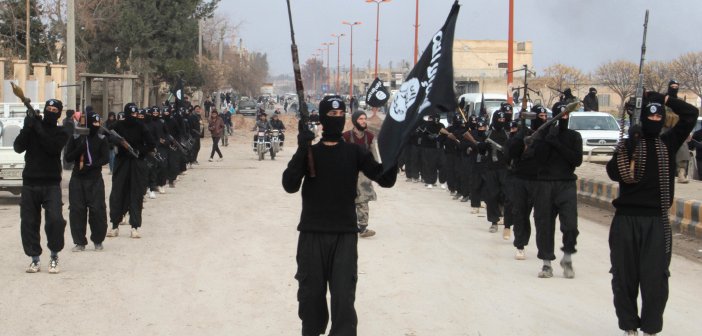
With this, the conversation shifted over to a proper understanding of Islamic texts. Stressing an urgent need for workshops on the Koran in its proper context in the Irish Muslim community, al-Qadri said this could be the first step towards “immunisation”.[pullquote]“Younger generations (of Muslims) go through identity crises. Often when they are second generation migrants, there are major cultural divides between schools, workplaces and the home place. They don’t know where they really belong.”[/pullquote]
“This is not happening in most of the mosques, and it exposes a vulnerable generation.” Backtracking for a moment there, he described how the brutal Wahhabi-Salafism of ISIS was predicted by the Prophet Muhammad in his verbatim Habith narrations. “These were foretold 1,400 years ago. The Prophet warned of a group emerging within the Muslim world known as Khawarij and they bear all the characteristics of Daesh.”
Khawarij, which means dissenters, or ‘to swerve from religion’ were led by a man known as Dhu’l Khuwaysirah from the tribe of Tamim. In the Hadith canons, Muhammad is written to have said that Dhu’l’s followers’ “prayer and fasting will make your prayer and fasting seem insignificant. They recite the Koran, but it does not go beyond their throats.” Their actions, the 14th Century Syrian Sunni scholar, Imam al-Haafiz Ibn Kathir, in Al-Bidaayah wan-Nihaaya, a revered work of Islamic historiography, wrote further on this Khawarij, and in quite prescient a manner, saying, “If they ever gained strength, they would surely corrupt the whole of the earth, Iraq and Syria. They would not leave a baby, male, or female. Neither man, or woman, because as far as they are concerned, the people have caused corruption: a corruption that cannot be rectified except by mass killing.”
Commenting further on this foresight, al-Qadri continued, using a Koranic sura (chapter), The Cow, as a point in his case. “The Prophet said they will misinterpret verses of the sacred text and will do takfir, which means accusing others of not being Muslim, and will kill these people. But the Prophet Muhammad, peace be upon him, said it clearly in the Koran: ‘there is no compulsion in faith.’ You can have any faith. Nobody can compel another person to be Muslim. God gave us the right to choose. Daesh don’t share this belief. Theirs is an absolutely evil understanding of the faith, that neither ordinary Muslims nor the Prophet ever propagated.”
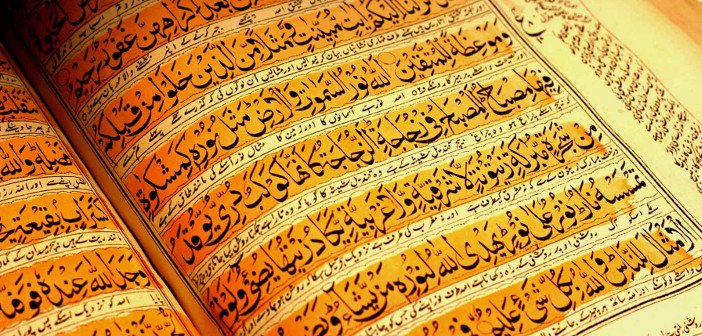
At this point, I chose to raise my curiosity about another verse in the Koran, namely one frequently deployed by radicals and anti-Islamic commentators alike, which is verse thirty-five in the fifth sura, The Table:
Those who fight against God and His Messenger, and hasten about the earth, to do corruption there: they shall be slaughtered, or crucified, or their hands and feet shall alternately be struck off, or they shall be banished from the land.
This, he explained, is the instructions for a just war, otherwise known as the lesser jihad. “A defensive war in Islam is permissible, but for only two reasons: if a Muslim nation is attacked and has no option but to fight back and save their lives and property. The second is to remove a tyrant, but for both just reasons, you need in Islamic law an authority to announce Jihad. No Muslim authority has done this, not the most prestigious university, al-Azhar in Egypt, nobody. ISIS is not doing the war Islam allows.”[pullquote]”You can have any faith. Nobody can compel another person to be Muslim. God gave us the right to choose. Daesh don’t share this belief. Theirs is an absolutely evil understanding of the faith, that neither ordinary Muslims nor the Prophet ever propagated.”[/pullquote]
“Even in just war,” he continued, “there are strict regulations. The Prophet said, you are not allowed to kill innocent people, non-combatants, unarmed adults, children, religious leaders or ambassadors. Suicide bombing is haram. You may not destroy religious or historical buildings, nor can you harm crops, or trees. The Prophet’s regulations are so strict, because he does not want you to fight. He wants a tyrant to be removed with a minimum of force.”
On the matter of innocent killings, I told him of an interview with Khalid Kelly, which I conducted several hours after the Charlie Hebdo shootings. Kelly, an Irish born convert to Islam, was formerly the head of al-Muhajiroun’s Irish branch. When I asked Kelly about why he could not only justify, but celebrate the killing of innocent civilians, his response was, “The governments are elected by the people. If they don’t agree, then they should remove these people.”
“Lunatic”, al-Qadri said without a moment’s hesitation.
“Yes, um…”
“He was justifying the killing of innocents? This is ignorance when it comes to understanding Islam. They do not know Arabic. They have not studied Islam or the Hadith”, he inhaled quickly, before shaking his head, and added with frustration: “Want to talk about scholars? He’s not even a student of Islam. The irony is he is the one with the opinion. It is a partial and selective understanding and one reached by understanding the Koran out of context.”
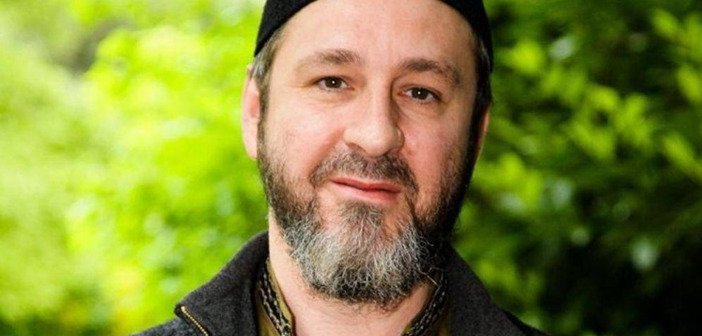
Pulling up a piece of paper, on which he had a few quotes printed, he proceeded to address, in detail the recurring issue of contextualising the Koran. His first point was to explain that the book was revealed to Muhammad over a period of 23 years, between 610 and 632 A.D. These revelations were recited, as opposed being written by him, owing to his being illiterate. “The verses were revealed gradually and according to the needs of somebody who came to him with a question. The Prophet would wait for the answer to be revealed to him, and there was always a very specific context to each verse. Out of that context, you cannot follow them.”
He read to me a verse often utilised by ISIL, taken from the ninth sura, Repentance:
Slay the idolaters wherever you find them, and rake them, and confine them, and lie in wait for them at every place of ambush. But if they repent, and perform prayer, and pay the alms, then let them go their way.
This verse, he explained, was revealed in the time of Muhammad, when Muslims for 13 years had endured persecution by non-Muslim Meccans. “They had never responded with anger or violence, instead either forgiving, or ignoring the assaults throughout their period of life in Mecca.” The conflict reached a temporary resolution, which lasted three months before this declaration of peace broke down while the Muslim people had migrated to Medina.
The Meccans conspired against them. They wanted to assassinate all Muslims, and so when the Meccan army approached, the Prophet heard, ‘God gives permission for people to fight against those who are fighting them, for the reason that they believe in God, and were expelled from their homes.’ When the verse was revealed, Muslims prepped for this war: Battle of Badr, but even with that, many of these Muslims had never even held a weapon before. They were reluctant to fight.
What ISIS does is take this to mean, ‘We must kill all infidels’, but it was only speaking of these infidels, not the non-Muslims in Blanchardstown, or Ireland. It’s not speaking about them. It’s not about Americans. We’re living in harmony here. This is exactly what the Prophet foretold of when listing the characteristics of Khawarij.
It was on the note of migration to Medina by Muhammad and his followers that I chose to raise the subject of the refugee crisis. Having travelled out to Calais quite recently, Dr. al-Qadri has witnessed this problem first-hand, and without even the need to ask a question, he immediately launched into the subject.
These refugees are fleeing exactly what happened on that one night in Paris. It was happening daily in their homes. They are genuine refugees feeling this threat. The worst thing the west can do is close our borders and say they are not welcome because we don’t know if they are ISIS, or not. We have to understand these are people that are fleeing for their lives. They don’t want to be part of a sick group who believe in a war against the whole world. Syrian people are in fact one of the most educated Arab nations. The Syria in which they lived was a society of pluralism. There were Christians, Jews, Muslims, living in harmony. It was amazing.
So to close our borders, well, this move would push many refugees towards radicalisation, because the choice after that is either die, or become our enemy. We have to accept them. We need a screening process, absolutely. I am in favour of screening, because if even a single person comes in disguise, then that will cause trouble for everybody; the Muslim community, its refugees, even, Christian refugees. But first, what we have to understand is that religion comes after humanity. There is nothing greater than humanity.
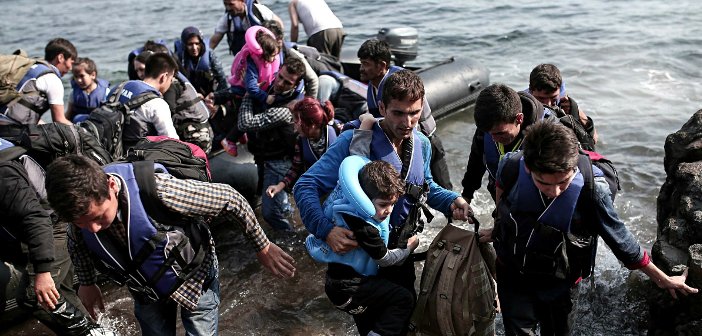
Before concluding, I asked if he could take me back to integration within an Irish context, to which he referenced the Netherlands, his place of birth. “From my experience there, I have seen how the Muslim community in many ways integrated into the larger society, but at the same time, became equally as isolated. This has led to problems, because Dutch people whom were once very tolerant a people have moved to support [right-wing leader of the Party for Freedom] Geert Wilders who’s like Donald Trump, both distant relatives of Hitler, same ideas, new packaging.”
By not integrating properly, this changed relations within the broader community. Without integration, one cannot raise transparency, or create mutual respect. Fortunately, at this moment in time, Ireland is different, but from what I have seen in the Netherlands, I know that things can change for the worst.
My worry is that although the Muslim community here is very progressive, still we need to be more open about our faith. If that is not done, then the media, which often highlights the sensational, by giving a small minority their attention, people will assume this is how we all are in Islam. The silent majority must now become vocal. This is why we established the Irish Muslim Peace and Integration Council, to reach out, and be transparent. The majority of mosques or Islamic centres teach peace, but the radical interpretation is somehow becoming popular, and it is because of what Saudi Arabia has done.”
[pullquote]“By not integrating properly, this changed relations within the broader community. Without integration, one cannot raise transparency, or create mutual respect.”[/pullquote]
“They are the hub for schools of radical thought: Wahhabism. What they did was spend millions abroad, building mosques and publishing free Islamic literature on the Wahhabi ideology. But, what made the difference was in the late 80’s and early 90’s, when Wahhabists went to Germany, France and Holland, and brought Muslim students back to Saudi Arabia, offering them free education, while training them in this radical interpretation. Those people went home and crucially, they were fluent in French, German, Dutch, so they could appeal to fellow young persons. This was how their recruitment centres began appearing in Europe.”
Indeed, this was a problem pointed out by Imam Dr. Ali al-Saleh, of the Shi’ite mosque in Milltown, the Ahlul Bayt Islamic Centre in Milltown. He took to Newstalk in September of 2014, warning that a strain of radicalism was present in Ireland. Specifically, he spoke about boycotting the Saudi Arabian Wahhabi preacher Mohammed al-Arifi, who was scheduled to speak in Ireland, but whose tour was prevented when Dr. al-Saleh informed Gardai of his ideological background.
Drawing to a conclusion, al-Qadri emphasised that Wahhabism is the common ideology of Daesh, Al-Qaeda, Boko Haram and the Taliban. “I’m not saying every Wahhabi is a terrorist, but every terrorist is from the Wahhabi school. These people are neither real Sunni, nor Shi’ite. They are adherents to the Saudi interpretation of Islam and this is something we need to be frank about when educating others. Our faith teaches us to be good humans, and neighbours, to give to charity irrespective of whether or not it is intended for Muslims, or non-Muslims. To be Muslim means to be a good person, and if there is anybody that teaches our children that we must hate Jews, or non-Muslims, then I have a problem with that. We must show respect for humanity, and life regardless of religion.”
